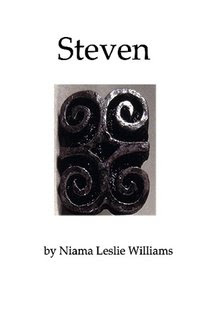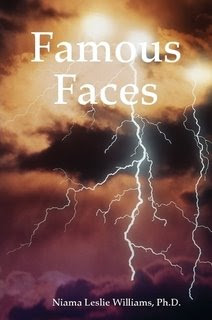

Famous Faces
By Niama Leslie Williams
Lulu Publishers
102 pages/$17.95
Steven
By Niama Leslie Williams
Lulu Publishers
84 pages/$17.50
By Thomas Gagnon
As I read Niama Williams’ poetry, I thought of Joan Armatrading’s early ‘70s songs, like the emphatic “Back to the Night” or the melancholy “Save Me.” A lot of Williams’ poetry is, on the one hand, about passion, physicality, and intimacy, and, on the other hand, about sadness, longing, and oppression. She also often writes about the need for safety, thankfully, since nobody (that I’ve met) talks about needing safety outside of group therapy. So, a brave woman and good writer speaks—
First, on safety—In Famous Faces, the poem “Forty Years” begins with “that voice that saved me/in the midst of a mad, mad sea.” (22) Halfway through, Williams writes six lines ending with the word ‘safety’: “my first thought of them…/is of safety/the gift of safety/a dangerous childhood I survived/but in their house/always safety…” The poem concludes, “I know safety/what it feels like/how it sounds/how to bring it/home.” (23) The word ‘safety’ may not thrill the soul, but it is crucial to staying alive, as she demonstrates in a powerful onrush of a poem, “For Vincent D’Onofrio as Bobby Goren,” farther on in the book. This over-riding need for safety appears again in Steven, in the poems “Black Wool Coat” and “Mama’s Washcloth,” in which these small things (coat and washcloth) signify a lasting sense of warmth and health.
Second, on passion, physicality, intimacy—All of them definitely break through in the poem “First Time,” when a black man, “nothing I have ever wanted/parts my legs/crushes my disdain/helps me entertain/for the first time/a black penis/without recoiling.” (18-19 of Famous Faces) So, Williams throws us seven lines of rhythmic, rhyming passion (and an inner shift, away from repulsion). The passion of “First Time” is followed not much later by “The Gaze,” “In the Elevator,” and “For Lisa,” all of which contrast physicality and artificiality: wet palms vs. a song, whamming your gut vs. politeness, warm lips vs. Renaissance studies. In Steven, Williams claims in “The Chain Sestina” that “i once fell in love with a bicycle chain,” but most of the poem is about her love for a Korean, Hun Ku, a name that she repeats rapturously, before her fall into an oxymoron of livable longing. (47-48) The opposite of all this appears in a poem called “There will be no Passion in This House.” Instead, there will be dust, sadness, fatigue, and phantom-existence. Moving right along—
Williams evokes sadness especially beautifully in two poems in Famous Faces: “The Cleaning Lady” and “Jasmine.” The opening lines of “The Cleaning Lady”—“the thin line of hair removed/makes me wonder”—become an over-arching metaphor for the rest of this poem, about a silently long-suffering cleaning lady. This metaphor gets poignantly repeated, in “vague pencil strokes,” “the pencil lines are what remain,” and “eyebrow pencil eyebrows.” (64-65) The cleaning lady’s pain is not a metaphor, after all. “Jasmine” conjures up good memories, like “liqueur of jasmine cooling throat.” Jasmine spells relief, until it fades to “no scent; thirst.” (85) Williams evokes oppression (the oppression of family obligations) in “Bending,” with recurring reference to her knees, knees habitually bending, knees beginning to break, knees getting tired, knees screaming. (My knees empathize.)
In Steven, Williams writes two powerful poems on longing. One is “A Vacant Lot,” once a place in which she ran barefoot, now neglected and overgrown with weeds, so that she tries “to walk barefoot in the city…/the concrete and glass assault my feet…” (66-67) Not being able to run barefoot, as she did then, could be literally painful, now. If only then were now. The other poem on longing is called “Marian C.’s Sestina.” The tension in this poem is summed up in four lines in the third stanza: “no farmboy, even in the abstract/was going to make her stay in arkansas./she’d been born south/but she wasn’t going to stay there and give up her painting.” She longs to leave “the hell that was Arkansas” for the first 36 lines, and then, in the last three lines, she does. (74-75) For Marian, longing leads to fulfillment.
There are many other excellent poems in both Famous Faces and Steven, too many to list here. Also, each poem is excellent for a different reason, for instance, playfulness with diction, or an incantatory style that suddenly shocks. This is not to claim that these poetry collections are flawless. In some poems, less would definitely be more. But, overall, there is a lot to love.
Thomas Gagnon./ Ibbetson Update/ Somerville, Mass./ April 2008



































Perhaps it is considered declasse for a poet to respond to a review, but this is my first unsolicited review, and I am so grateful to read the depth of Thomas Gagnon's understanding of my work. What a poet wants most is to be heard, to be understood, to be appreciated, and Gagnon substantiates all three with dense academic analysis which I, as a former lit professor, deeply appreciate and respect.
ReplyDeleteThank you Thomas Gagnon, Doug Holder, and my dear friend Afaa Michael Weaver; you three have made me a very happy poet this night.
Sincerely,
Dr. Ni